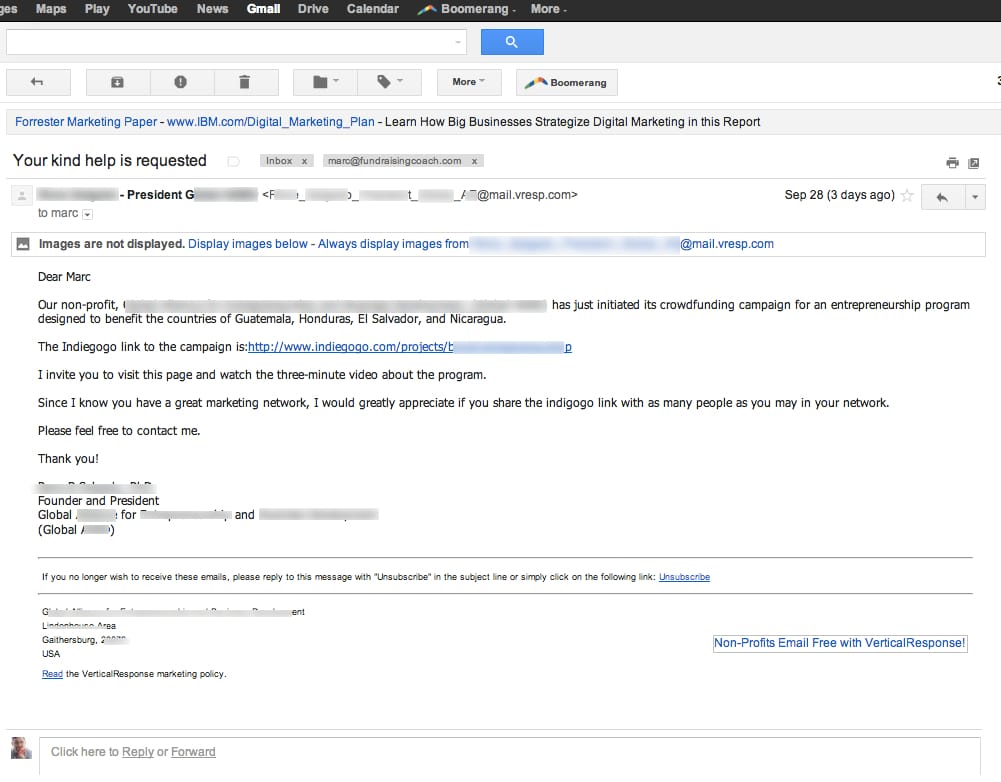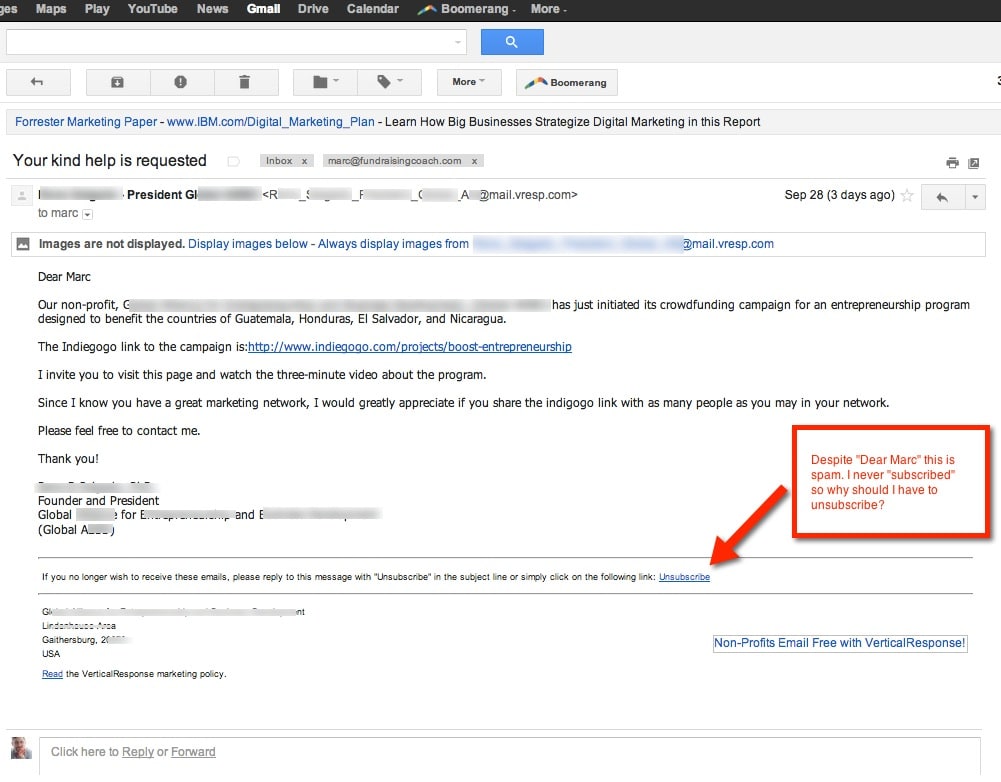Crowdfunding has opened up funding for some wonderful projects. But according to their own stats, the majority of Kickstarter projects fail. And a full 10% never raise any money.
How to stay out of the majority of crowdfunding campaigns
I’m going to show you three strategic tips that will help keep your crowdfunding campaign out of the majority that fail. To do that, I’m taking a page out of Tom Ahern’s playbook. One of the best things about hearing Tom Ahern speak is his prolific use of real-life examples. When I received this email last week, I knew it would be perfect for an Ahern-like post.
The first 3 things that they got wrong (it’s not Indiegogo’s fault)
-
Don’t send me the first email once it’s gone live
Like I say in “Fundraising on the Web: It’s more than just a birthday wish,” successful online fundraising happens before the event! Like any fundraising event, you need to do a lot of prep work. There should be a committees or a project teams and lots of outreach. Make a list of “influencers,” people who will be able to help get the word out. Let them become part of the the creation of the campaign. Let them own it.
Take away: If you think someone is worth approaching for the campaign, chances are they’re worth approaching before the campaign. If you’re first contact is when the clock is ticking on your campaign, you’ve waited too long.
-
Don’t ask me to push it out to my network on the first contact
I don’t know you but now you’re saying you “know” I have a “great network”? Well, for your information, those people who seem like a group of strangers for you to exploit are actually my friends. My network is largely personal relationships that I’ve worked hard at cultivating. Now you are asking me to risk my reputation on something I know nothing about? That’s a no go.
Take away: Don’t try to use my friends. Get to know me first.
In a recent Hangout with Creating the Future, Hildy Gottlieb shared the folks at StartSomeGood call these “PEERfunding campaigns” rather than crowdfunding. I love that. I wonder how this person would’ve changed her approach if she’d thought of my network as “my peers.” And thought of me as a “peer.” I think she’d have appealed to something like “your friends probably share these values too.” I like to think I would’ve responded better.
-
Don’t make me unsubscribe me from a list I didn’t sign up for!
As if to prove that point that this isn’t a personal message, despite my name being merged in the email, I learn at the bottom that I’m “subscribed” to a list I never signed up for!
This is called spam. I can’t stand this.
Now I know I’m just one of the crowd. You don’t really care about me. You just care about getting your project in front of people I know. For all I know, everyone receiving this had the ego-stroking “your network is large” phrase.
Take away: Be really careful about adding people to lists. If enough of them report your email as spam, you could have problems far larger than a failed crowdfunding…er “peerfunding”…campaign.
What do you think?
Those were my visceral reactions to receiving that Indiegogo campaign email. Do you think I’m overreacting?
What have your experiences been with fundraising on Kickstarter, Indiegogo, or any other crowdfunding site?
For more information on successful crowdfunding, check out 6 Channels to Call in the Crowds to Your Crowdfunding Campaign.










Marc,
Your viscera are probably justified based on the approach. I wonder, however, if you were approached earlier in the process, would your ultimate decision not to pimp your network have been different or would you have just come to that decision in a gentler way?
This, for me, just well illustrates that “crowd-funding” is, as you say, peer funding and not truly crowd-funding. The model may not be flawed but the modus certainly is. For cause-based efforts, these platforms only seem to work when you are able to port your pre-formed following from one network onto one of the canned platforms. Then the platform skims a transaction fee from your network.
I have seen some efforts trying (but not yet succeeding) to introduce roving (virtual) crowds to new causes (see e.g. hopemob.org) but platforms like Indiegogo and Kickstarter are not doing that.
Steve
Thanks, Steve.
I love the way you word it. Reading your comment, I got the sense that it’s almost like this ED is wanting me to take my friends from the pub we hang out at and go to a coffee shop.
That’s not going to happen.
But if she got to know us a bit at the pub, it’s more likely that at least some of us would join her for coffee.